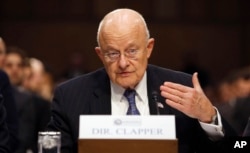U.S. defense officials say an Islamic State operative captured by American special-operations forces is a key figure in the militant group's chemical-weapons program in Iraq, where new gas attacks by the terror group were reported Wednesday.
The unidentified suspect's detention was reported last week, but his link to chemical weapons was not disclosed until now by defense officials who requested anonymity. The Islamic State agent was captured during raids in Iraq and Syria by a U.S. "expeditionary targeting force," assigned to gather intelligence and identify high-ranking IS leaders.
A Pentagon spokesman, Captain Jeff Davis, would not comment on recent operations but made general remarks about the "expeditionary targeting force."
“One of the goals, one of the missions we anticipate they they will do is that they will capture a small number of ISIL leaders," he said, using another acronym for Islamic State. "The detention of these we anticipate to be very short term. It will be coordinated with Iraqi authorities.”
Officials in Iraq told VOA Wednesday that Islamic State fighters fired rockets loaded with mustard gas, also known as sulfur mustard, into a town north of Baghdad late Tuesday and early Wednesday. Iraqi and Kurdish officials said dozens of civilians were injured by the attack on Taza Khurmatu, a town whose residents are mostly Shi'ite Muslim ethnic Turkmens.
“The rockets spread a garlicky smell and caused nausea and vomiting," according to Soran Jalal, head of Taza Khurmatu’s civil defense office. He told VOA that investigators confirmed the weapons carried mustard gas.
A commander in Kirkuk, the Kurdish population center north of Turkmen town, estimated about 30 people required hospital treatment. Lieutenant Muhammad Qadir told VOA at least five of the wounded had facial burns caused by chemical agents.
Separately, a police official in Kirkuk, Brigadier General Sarhad Qadir, said it was determined the rockets were fired into Taza Khurmatu from territory controlled by the Islamic State group.
U.S. officials are aware of the group's use of such weapons.
“We know that they have used chemical weapons on multiple occasions in both Iraq and Syria and we should have no misconceptions. … This is a group that does not observe international laws or international norms. They have demonstrated they will stop at nothing to inflict death and destruction on innocent people,” Pentagon spokesman Davis said. “Sulfur mustard - it’s usually in a powdered form and it’s put into artillery shells, rockets. And when those blow up it creates a dust cloud that can primarily aggravate but in large doses can absolutely kill.”
U.S. officials say Islamic State is still developing its chemical weapons program, so some reports about the terror group’s use of chemical weapons on the battlefield is “still largely about fear.” Islamic State fighters still find it easier to manufacture and use improvised explosive devices (IEDs) or to use suicide bombers to inflict casualties, according to the American officials.
Correspondent Sharon Behn in Iraq and VOA reporters Rikar Hussein and Dlchad Anwar contributed to this report





